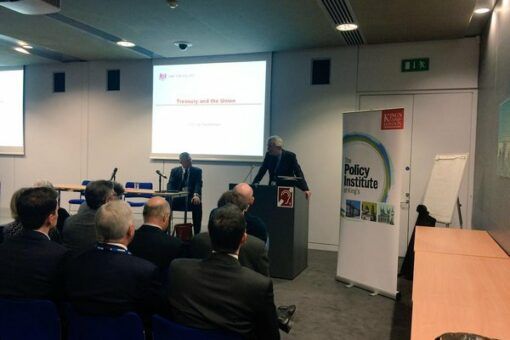
Sir Nicholas spoke at the inaugural event of the Strand Group, the Policy Institute at King’s College London’s newly-established signature seminar series, which took place at HM Treasury.
In front of a diverse audience of Strand Group invitees from the worlds of governance, business and academia, alongside Treasury officials, Sir Nicholas outlined the Treasury’s historic role in financing the United Kingdom, before discussing its more recent role in the Scottish Independence Referendum.
Sir Nicholas noted that it was ‘striking that the Treasury coordinated all the work that set out the case for the Union’, explaining that this was seen as a ‘head versus heart referendum’, and it was thought by ministers that the economic case would prove most effective in encouraging a ‘No’ vote.
Outlining the results of the Treasury’s research, the Permanent Secretary said that an independent Scotland ‘would have had the largest deficit of any advanced country’, as well as a higher unemployment rate and a higher exposure to financial shocks due to the disproportionate size of its banking sector when compared to its population.
The Permanent Secretary also downplayed the role of North Sea oil in an independent Scotland: ‘Anybody who’s been in the Treasury for any amount of time is used to North Sea production disappointing on the downside… the time when North Sea revenues amounted to 8% of GDP has passed.’
The Treasury’s position had hardened over time against the idea of a currency union with an independent Scotland: ‘At the time it was argued that the Treasury was bluffing… Of course the Treasury would have had an interest in a successful Scottish economy… but I am absolutely certain that the UK would not have entered into a currency union with an independent Scotland.’
Responding to a question from the Independent on Sunday’s John Rentoul, Sir Nicholas said the Treasury had had ‘extensive debates’ on whether Alex Salmond took the right approach regarding a currency union with the UK, but that ‘we didn’t regard this as our problem. It was one for Mr Salmond to solve’.
Asked by former Cabinet Secretary Lord O’Donnell if the Treasury had made any contingency plans for the possibility that Scotland could leave, Sir Nicholas denied that the Treasury had, but then stated that ‘you do have to be ready’. When asked about a previous comment that the Treasury had made ‘contingency plans for contingency plans’, the Permanent Secretary said, ‘I think that’s what you have to do’.
Lord O’Donnell also congratulated the Permanent Secretary on maintaining civil service independence throughout the referendum. Sir Nicholas responded by stating that the civil service was not independent, in that it serves the government of the day.
Sir Nicholas told the assembled group that he was ‘not a great fan of the civil service doing endless war games about different outcomes of elections’, but that if the polls were to stay the same, he thought that officials should be looking at what to do in cases of minority government. ‘If you’re in the Treasury, you’re always worried about what minority governments lead to, and who pays for it. But we’ll cross that bridge when we come to it’. The Permanent Secretary said that he would be taking advice from his predecessors, such as Sir Douglas Wass, who was in the audience, and others.